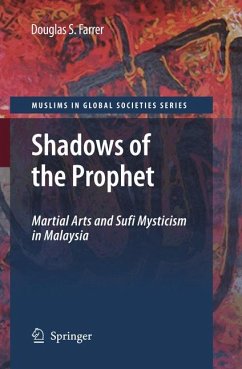This account combines theories from the anthropology of art, embodiment, enchantment, and performance to show how war magic and warrior religion amalgamate in traditional Malay martial arts, where practitioners distance themselves from "becoming animal" or going into trance, preferring a practice of spontaneous bodily movement by summoning the power of Allah. Silat and Sufism are revealed through the social dramas of 40-day boot-camps where Malay and European practitioners endeavor to become shadows of the Prophet, only to have their faith tested through a ritual ordeal of boiling oil. The unseen realm and magical embodiment is further approached through an account of Malay deathscapes where moving through the patterns of silat summons the spirits of ancestral heroes.
Those interested in Malaysia, Sufism, transnational Islam, and the study of religion, conversion, magic, sorcery, theatre and martial arts will find this book indispensable. "the eagerly awaited monograph on the practice of silat" Joel S. Kahn "No other work on silat has achieved this level of inside understanding" Roxana Waterson
Dieser Download kann aus rechtlichen Gründen nur mit Rechnungsadresse in A, B, BG, CY, CZ, D, DK, EW, E, FIN, F, GR, HR, H, IRL, I, LT, L, LR, M, NL, PL, P, R, S, SLO, SK ausgeliefert werden.









